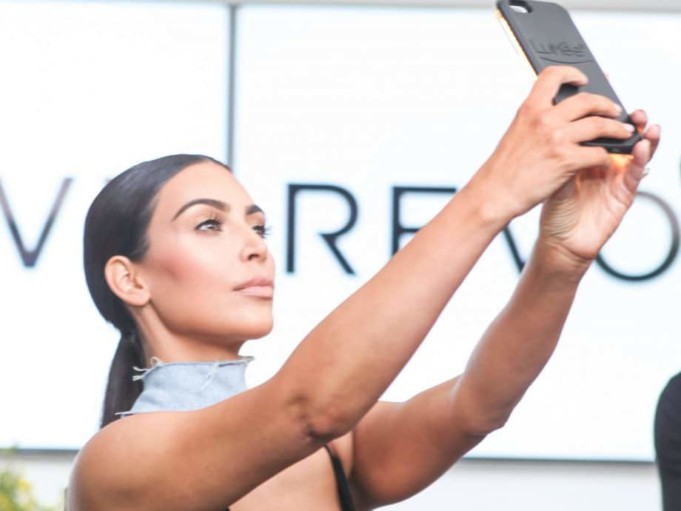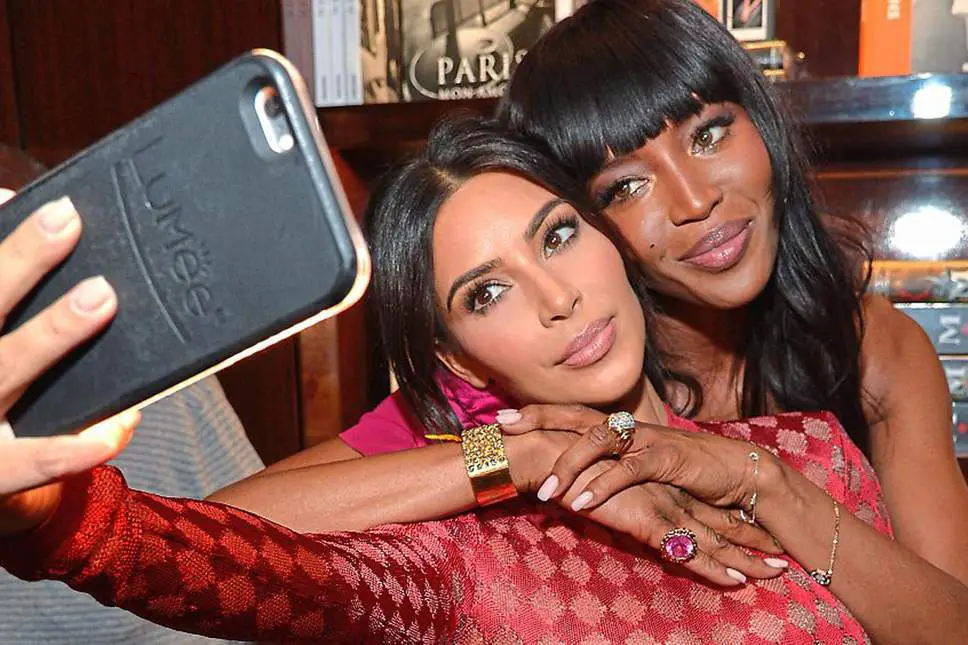A new term has been derived to classify people who love taking too many selfie photos. Though it may sound funny, there are some pretty serious concerns about this obsessive habit.
If you think that people who regularly share “selfie” pictures on their social media handles are self-obsessed and vain, you might just be right. You might have some strong backing from the opinions of experts.
“Selfitis” is a term invented to classify the cultural habit of taking an overwhelming amount of photos of oneself and sharing it on social media sites such as Facebook, Twitter, Snapchat, Instagram and others.
Today, most people see it as a regular occurrence for celebrities to cart their image into the stratosphere by regularly posting pictures of their lives, loves and their adorable selves.
Pop icon Taylor Swift preserves her strong yet sexy edge on Instagram in frame after frame to the approval of her over 100 million followers on Instagram.
Also, reality TV star Kim Kardashian West became such a pro at taking selfies that she published a bestselling book filled with her self-portraits and she titled it “Selfish”.
However, not everyone suffering from selfitis focuses on glamour shots. An example is Vital Rasklov who concentrates on taking freaky vertigo-inducing photos while “photobombing” the shot with either his arm or foot atop some of the tallest buildings in the world.
This freakish behaviour, however, has gotten him banned from China. At almost 90 years of age, Helen Van Winkle is pretty vibrant and makes fun of everything around her using selfies.
If you search “baddiewinkle” on Instagram, you’ll find the sassy lady smiling from cheek to cheek wearing a marijuana t-shirt and shiny cat-eye glasses, playing beer pong, or bashfully posing in a red body-hugging strapless dress and thigh-high boots.
What if you’re not a celebrity?
Regular people especially millennials and teens aren’t unsusceptible to the social media self-promotion saga. With built-in editing tools and links to many sharing platforms, it’s quick and easy to colourise, crop and post.
“The teen years, especially, can be a time of social anxiety and depression,” says, Heather Olsen, a guidance counsellor at Kootenai Bridge Academy in Idaho. “With all of the filters available, it’s possible to portray your ideal self.
A flattering photo will make you feel good, and the number of ‘likes’ you get makes you feel even better. That creates a dopamine boost and pretty soon, you’re addicted to the cycle.”
But when does posting funny pictures of family and friends become a “condition”? And when does that condition become a real issue?
Recently word spread online that a new mental disorder has been established by the American Psychiatric Association (APA) called “Selfitis” which entails taking obsessive photo taking and posting as a way to gain attention and compensate for lack of intimacy and low self-esteem.
As possible as this might sound the APA has not officially confirmed it, and uncontrollable posting of selfies is not considered a mental disorder. However, a lot of behaviour scientists think that excessive selfie posting calls for concern.
Elaine Ducharme, PhD, a board-certified clinical psychologist in Connecticut, believes that sharing selfies is not in itself the main issue, but just as other things like drinking, gambling and even sex can become an addiction so also taking and sharing countless amount of selfies can become addictive.
A 2017 study published in the International Journal of Mental Health and Addiction examined the selfie habits of hundreds of young people at an Indian university. India was picked because it has the most Facebook users on earth.
Selfie takers said they felt they were showcasing themselves in the best possible light and establishing individuality. The researchers cited that “selfitis” has been associated with narcissism as well as the lack of consideration for others.
Dr Ramani Durvasula, a professor of psychology at California State University Los Angeles explained that a person is said to be suffering from selfie addiction when he/she is almost obsessed with taking selfies several times a day and sharing on social media platforms such as Facebook, Instagram, or Snapchat.
She stressed that it calls for alarm if more than half of your pictures are selfies and you’re enhancing them with filters and other beauty tools to make yourself look better.
In addition to being a sign that you’re searching for love in all the wrong places, posting a truckload of selfies might literally be annoying to your friends, according to a study carried out in the United Kingdom.
The study’s lead author, Dr David Houghton, explained that it is because people other than relatives and close friends don’t seem to flow well with those who consistently post photos of themselves.
Not Ready For Close-up
Also, a recent study published in the journal JAMA Facial Plastic Surgery cited that plastic surgeons reported an increase in the number of people requesting for facial reconstruction just because they not like the way they appear in selfie shots.
Members of the American Academy of Facial Plastic and Reconstructive Surgery stated that 55 percent of their clients request for nose jobs solely because their nose appeared bigger in selfies. But only 13 percent of those who responded to the survey agreed that they performed selfie-inspired surgery.
Because selfies are shot at close range, the camera actually distorts a person’s features, so the bigger nose you see is just a misrepresentation. Yet some individuals will believe the distortion as reality.
Dr Boris Paskhover of Rutgers University, a contributor to the JAMA report, stated that “Young adults are constantly taking selfies to post to social media and think those images are representative of how they really look, which can have an impact on their emotional state.
I want them to realise that when they take a selfie, they are in essence looking into a compact funhouse mirror.” Ducharme added that the real questions that need asking and should be taking into consideration are:
- How much time and mental energy does someone put into sharing selfies?
- What does it mean to the person?
- Do they see it as a healthy way of posting or are they obsessively sharing so they can count the number of ‘likes’ and boost their self-esteem and even mood on other people’s responses to the pictures?
- Is this their only link to the outside world?
- And, are they scared to indulge in real conversations and relationships?
If you find yourself lost in the world of excessive selfie posting, it might be time for a self-evaluation.
Ask yourself:
- Why am I doing this?
- What do I stand to gain out of it?
- Am I trying to make friends and create stronger connections?
- How would it feel if I stop?
Look for other ways to fill those voids. Put down your smartphone and start interacting with people face to face. Your friends might thank you for it.













